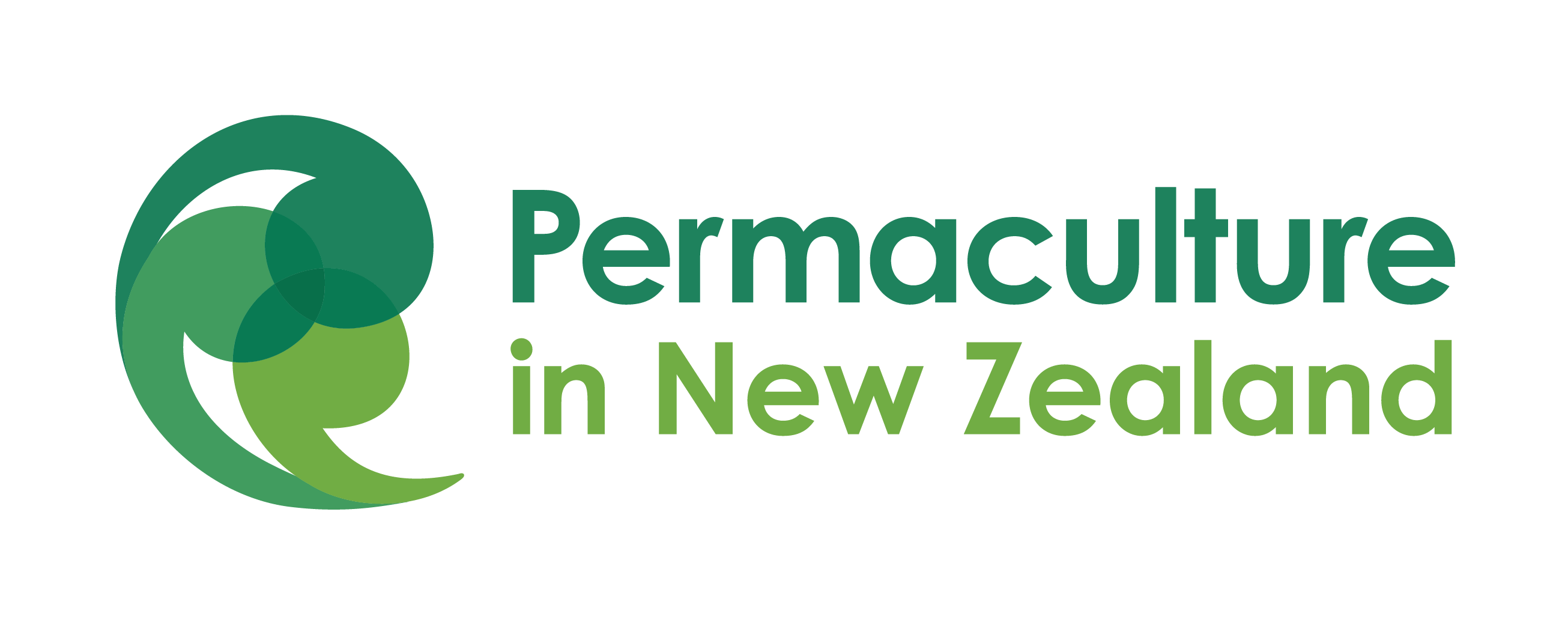Kia ora koutou Permaculture Whānau,
Firstly, apologies on behalf of the council for the delay in getting this newsletter out to you all, as we mentioned there were some issues with our newsletter system but it is now resolved.
This newsletter shares some amazing stories of permaculture being celebrated in backyards within Auckland/Tāmaki Makaurau and an open invitation stands for you to get involved if you live in the area.
Behind the scenes, the Permaculture in New Zealand Council members have been working hard meeting on a weekly basis to get some big projects underway, continuing work on the new website, building relationships with businesses to deliver new member benefits and continuing the upskilling of the newly elected council members.
If you are a paid member you have the ability to list your own personal events, workshops, open gardens and activities on our website, and I encourage you to head over to our website and fill in the form. We will get your event loaded and then share it more widely through a range of channels.
This month we farewelled Merve, who has been responsible for delivering the newsletter for the last 12 months. Merve has had to redirect her focus into other areas of her life including at Hakea in Raglan. We wish her all the best and thank her for all of her work over the past 12 months.
Finally, make sure you read all the way to the end as we have news about the National Permaculture Hui and we are excited to be able to start sharing the plan with you over the next few months.
Ngā mihi
Fiona Moorhouse
Chairperson
Permaculture in New Zealand
Urban permaculture gardens on show
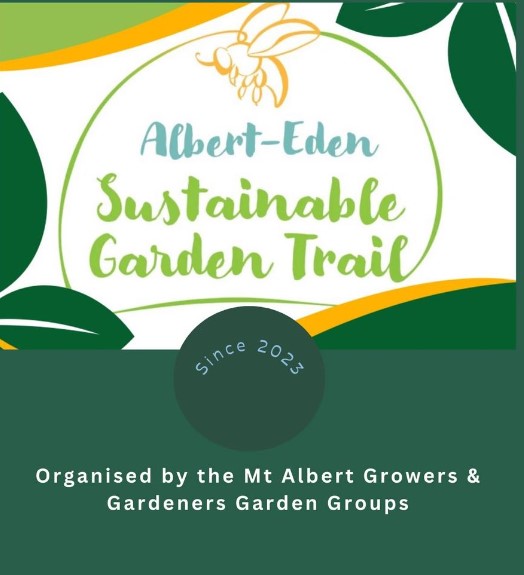
A total of 11 gardens featured in the trail, including the Pourewa Māra Kai, Nursery and Rongoa, St Johns Food Forest, Tāmaki Urban Market Garden, and Wadhamville Garden for Wellbeing.
There were more than 1600 visits across the gardens over the two days. Getting more kids to the Trail was the emphasis this year and a 14% uplift from 2023 is definitely encouraging. On Saturday, 18 members of Bike Auckland cycled the Trail visiting gardens on mass and demonstrating sustainable transport.This year, four gardens designed using permaculture principles were featured in the Trail, three of which are Gift-The-Garden projects, a movement based on Permablitz, delivered by volunteers using recycled material as much as possible.
Read more about the Trail

Nourishing TranquillityNourishing Tranquillity in the suburb of Glendowie is Penny Steven’s garden, designed and delivered by Gift-The-Garden in 2023. The maturity of the plants is amazing in such a short time, some six months after planting. Penny’s garden features a permaculture pyramid for growing maximum food in a small space, a meditation pyramid, two moon gates, a hexagonal greenhouse and a herb spiral. Of particular interest is the crushed concrete path which provided extended driveway space, whilst creating a habitat for plants and insects; it was inspired by John Little of the UK who uses waste material to increase biodiversity.
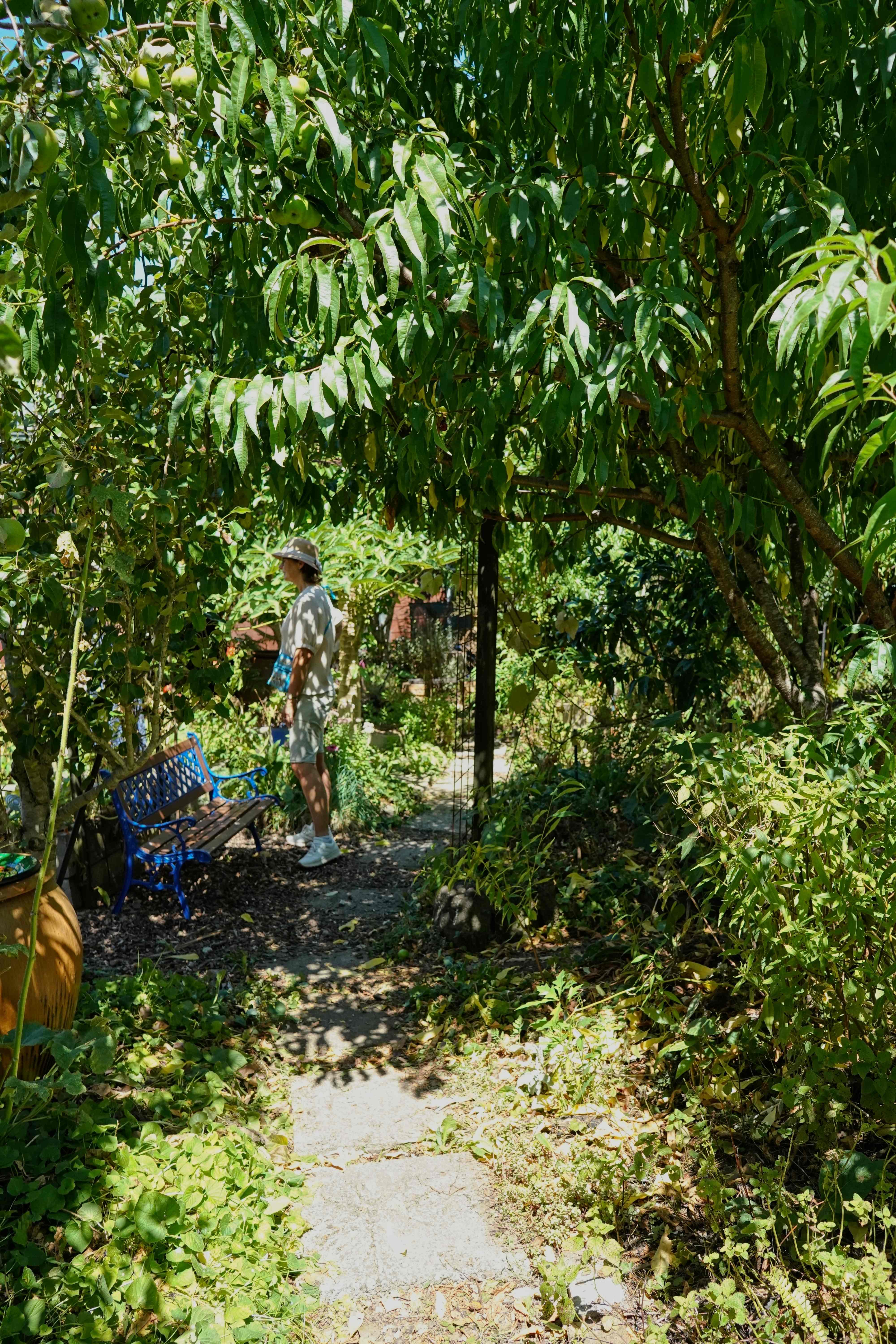 St Johns Food ForestOver 15 years, this mature food forest has become an exemplary demonstration of its type. Nurtured by Ellen Eskilsden, a Gift-The-Garden designer, the garden provides abundant year-round food foraging, chickens and medicine. Ellen runs regular workshops through Selwyn Community College and is the creator of beautiful garden art. This garden is recognised by the Moths and Butterflies of NZ Trust as an excellent habitat.
St Johns Food ForestOver 15 years, this mature food forest has become an exemplary demonstration of its type. Nurtured by Ellen Eskilsden, a Gift-The-Garden designer, the garden provides abundant year-round food foraging, chickens and medicine. Ellen runs regular workshops through Selwyn Community College and is the creator of beautiful garden art. This garden is recognised by the Moths and Butterflies of NZ Trust as an excellent habitat.
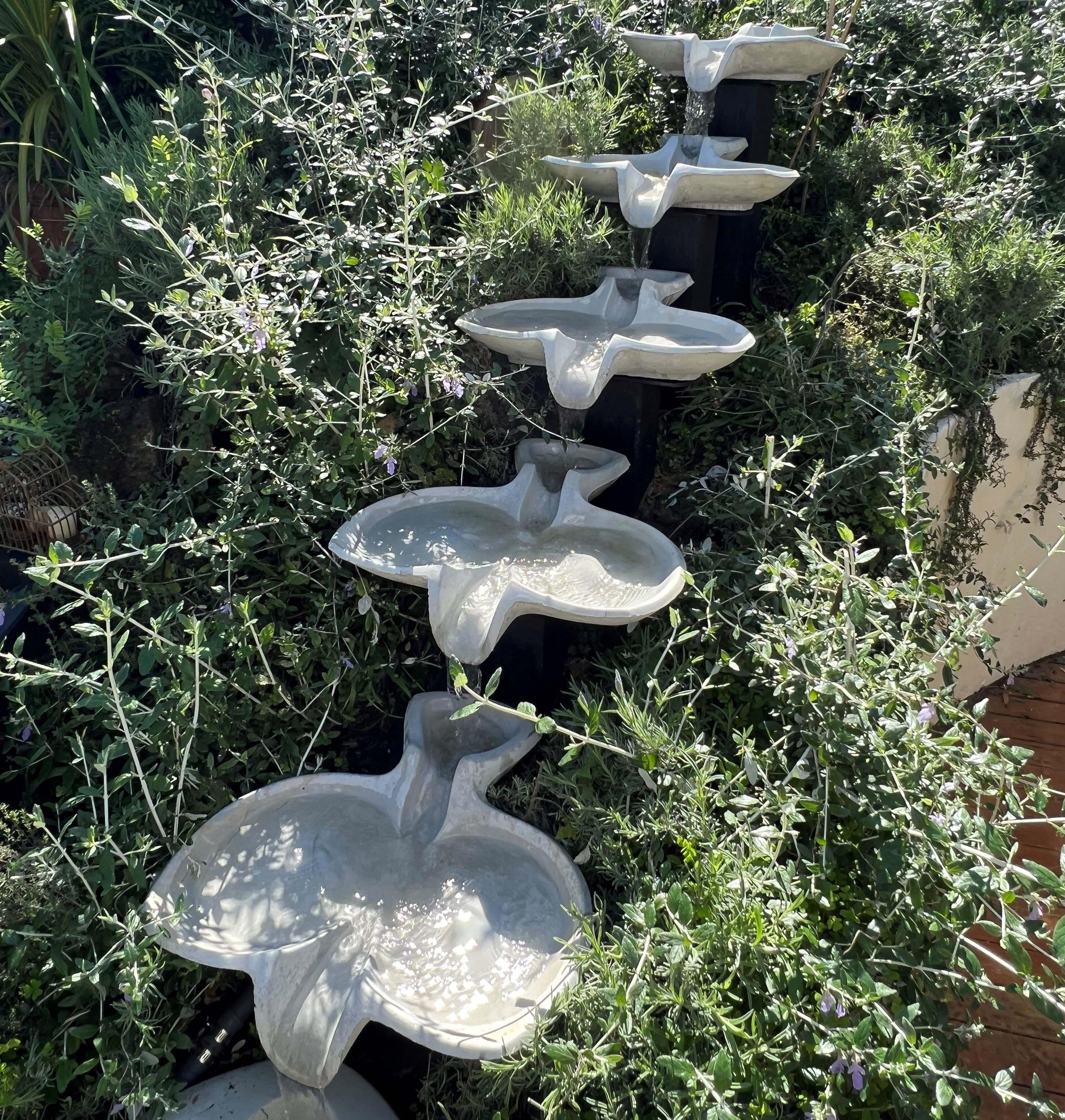
Wadhamville Garden for WellbeingThis terraced garden in the suburb of St Heliers is Amanda Warren’s permaculture demonstration garden featuring chickens, bees, guinea pig “lawnmowers” and a Flowform amongst many other ideas promoting urban self-sufficiency and beauty. Amanda aims to demonstrate that permaculture and high-end landscape architecture can work beautifully together by design, especially important for people living in an urban setting with a small space.
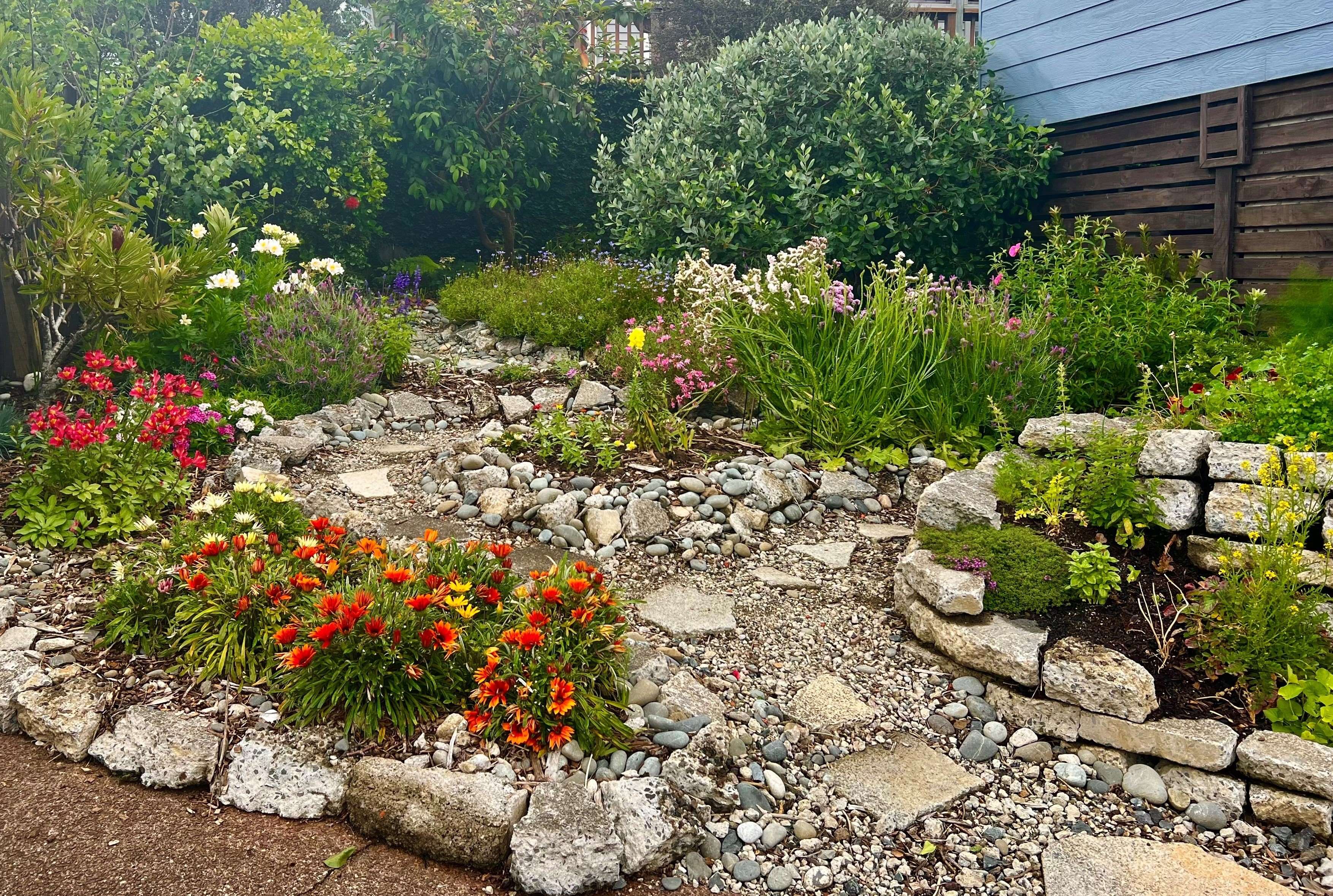
The GiftIn Wai-O-Taki Bay, Ruth Donde’s 400sqm section has been transformed using urbanite, cardboard and mulch, turning a cracked waste desert lawn which water flashed off into a lush environment providing all of Ruth’s fruit and vegetables (24 types of fruit and nut trees) and a wonderful habitat for local wildlife including wētā and tauhou. This was the first full Gift-The-Garden project delivered in 2021.
Inspired originally by the Taranaki Sustainable Backyard Trail, this Eastern Bay trail was funded initially by Ōrakei Local Board’s Wildlink programme with sponsorship from Naylor Love and support from Remuera Lodge, and the newly formed Auckland East Community Network. The Eastern Bays Trail has now seeded two more Trails in Tamaki – The Albert Eden Sustainable Garden Trail (November 16-17) and Hibiscus Coast Edible Garden Trail (May 4-5), with more to follow. Organisers are still looking for more gardens to add to the trails, so put your hand up if you’d like to add your amazing permaculture property to the roster and inspire others keen to learn more about urban permaculture. Get in touch!All garden photos by Carol Jardin (https://www.chocolatandco.net). Text by Amanda Warren.
Principle 8: Use and value diversity
This is arguably one of the easiest principles to live, work and grow by. Often, we’re doing it without even thinking about it overly much.In our everyday life, diverse communities allow us to tap into different ideas and learn from each other’s way of being and doing. Simply sharing a meal or a laugh with someone from a different country or a different generation often enriches our day in subtle ways we cannot appreciate until much later.At work, exchanging ideas with different groups and departments often strengthen and aid in achieving goals and running programmes. Diversity management – promoting inclusiveness and preventing discrimination – recognises the inherent value of listening to and processing ideas from those who are different from us. In nature, of course it is easy to recognise the benefits of polycultures and intercropping to reduce pests and diseases, increase yield and crop value, and support soil ecosystems. Diversity in nature helps build resilience, whether we use the idea in successional sowing or livestock management. If you’ve ever been taught not to put all your eggs into one basket, you’ve learned to value and use diversity.Photo by Shane Rounce/Unsplash. Text by Mei Leng Wong.
Share your permaculture journey
We’d love to update the Permaculture Council website with some stories from our members about their experience. Write in to
newsletter@permaculture.org.nz, with your answers to these questions:
Where are you? When did you start? What is the name of your garden/farm/property?What is your vision and intention for your piece of paradise?What was the biggest challenge? Attach at least 5 photos of yourself and your property that we can use with your story. And finally, leave a phone number in case we need more info in a hurry. Further updates to the new Permaculture Council websiteCouncil members are working hard to improve our current website to serve members better. We’ve listened to feedback and are well aware of the need to deliver more reliable information, focused on New Zealand conditions. We’re working on it!
Save the dates! You might have heard us talking about a National Permaculture Hui over the past few months, so it’s time to lock in the weekend of November 9th & 10th and stay tuned for more information over the coming months.

Looking to connect?
Coming up this month our members are holding events around the country. Head over to our website and check out what is being offered in your local area.If you are a member and have an event coming up that you would like to promote on the website, please get in touch by emailing Permaculture In New Zealand.
